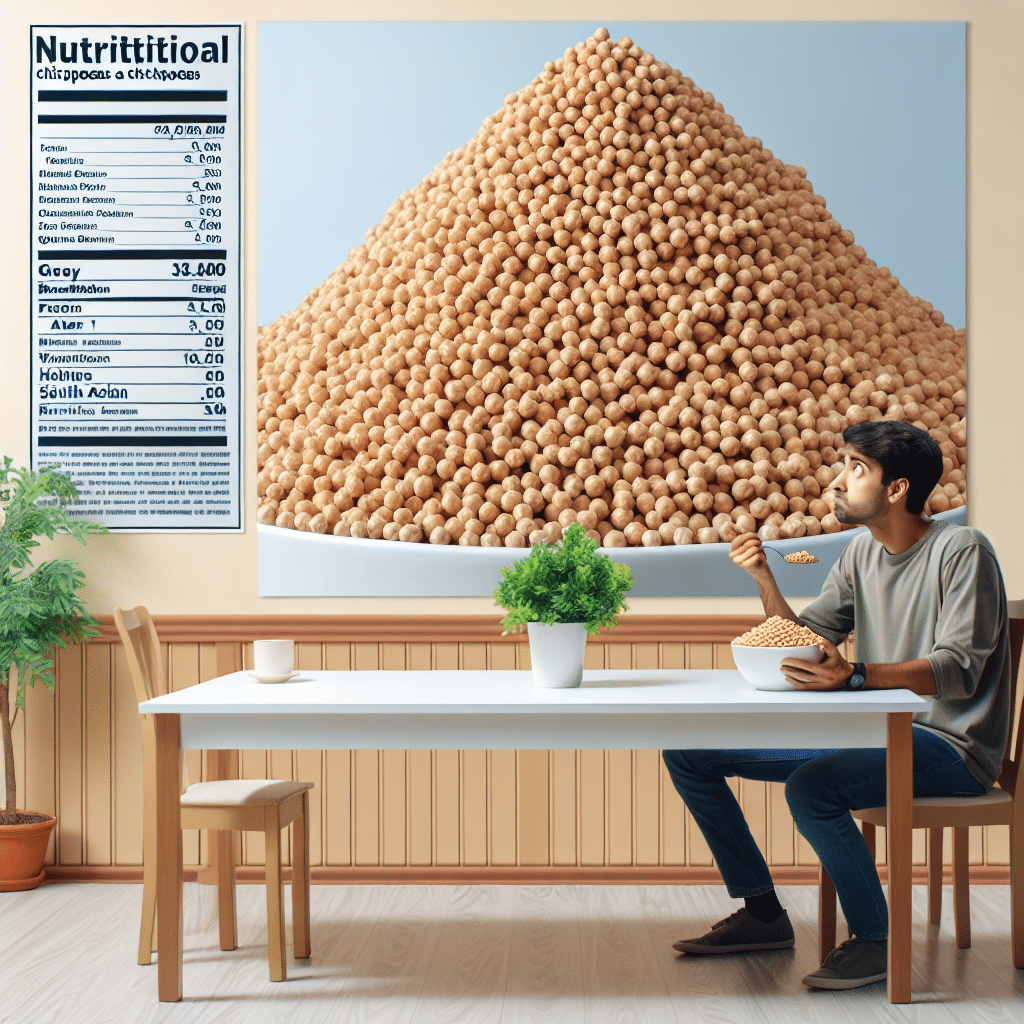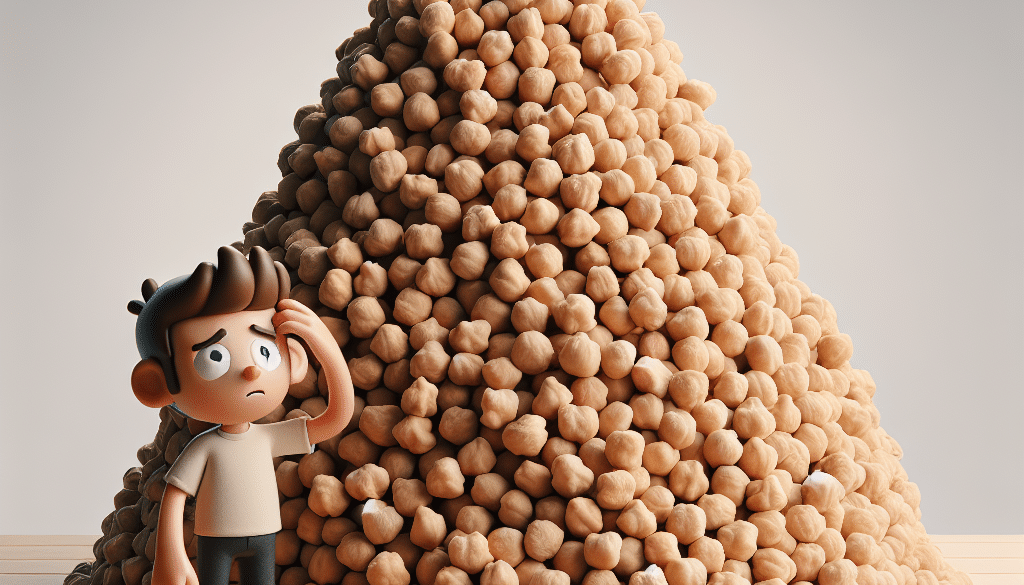Can You Eat Too Many Chickpeas?
-
Table of Contents
Chickpeas: How Much is Too Much?

Chickpeas, also known as garbanzo beans, are a staple in many diets around the world. They are packed with protein, fiber, and a variety of vitamins and minerals, making them an excellent addition to any meal. However, as with any food, it’s possible to have too much of a good thing. In this article, we’ll explore the benefits and potential downsides of consuming chickpeas, and answer the question: Can you eat too many chickpeas?
The Nutritional Profile of Chickpeas
Before diving into the potential risks of overconsumption, let’s first look at what makes chickpeas a nutritious choice:
- High in protein: Chickpeas are a great source of plant-based protein, which is essential for muscle repair and growth.
- Rich in dietary fiber: The fiber in chickpeas helps promote digestive health and can aid in weight management.
- Full of vitamins and minerals: Chickpeas contain vitamins such as folate, thiamine, and vitamin B6, and minerals like magnesium, iron, and zinc.
- Low in fat: Chickpeas are naturally low in fat, with most of the fat being polyunsaturated.
Health Benefits of Chickpeas
Chickpeas offer a multitude of health benefits:
- Improved digestion: The fiber content in chickpeas can help prevent constipation and promote regularity.
- Blood sugar control: The low glycemic index of chickpeas makes them beneficial for blood sugar regulation.
- Heart health: The soluble fiber, potassium, and other heart-healthy nutrients in chickpeas can contribute to cardiovascular health.
- Weight management: The protein and fiber in chickpeas can help keep you feeling full, which may prevent overeating.
Potential Risks of Overconsumption
Despite their health benefits, eating too many chickpeas can lead to some adverse effects:
- Gastrointestinal issues: Overconsumption of fiber can cause bloating, gas, and abdominal discomfort.
- Caloric intake: Chickpeas are relatively high in calories, and eating them in large quantities can lead to weight gain if not balanced with physical activity.
- Mineral absorption: Chickpeas contain phytates, which can bind to minerals like iron and zinc and reduce their absorption.
- Allergic reactions: Some individuals may be allergic to chickpeas, and consuming them can trigger symptoms.
How Much Chickpeas Should You Eat?
So, what is the right amount of chickpeas to include in your diet? While there is no one-size-fits-all answer, moderation is key. A typical serving size is about 1/2 cup cooked chickpeas, which provides a healthy dose of nutrients without overdoing it. It’s also important to consider your overall dietary pattern and how chickpeas fit into it.
Case Studies and Research
Several studies have highlighted the benefits of including chickpeas in your diet. For instance, research has shown that chickpea consumption can improve cholesterol levels and reduce the risk of chronic diseases such as type 2 diabetes. However, these studies also emphasize the importance of balance and moderation.
Chickpeas in Different Diets
Chickpeas are versatile and can be included in various dietary patterns:
- Vegetarian and vegan diets: As a plant-based protein source, chickpeas are an excellent option for those following meatless diets.
- Gluten-free diets: Chickpeas are naturally gluten-free, making them a safe choice for individuals with celiac disease or gluten sensitivity.
- Mediterranean diet: Chickpeas are a common ingredient in Mediterranean cuisine, known for its health-promoting properties.
Conclusion
In conclusion, chickpeas are a nutritious and beneficial addition to most diets, but they should be consumed in moderation to avoid potential negative effects. By paying attention to portion sizes and listening to your body’s signals, you can enjoy the health benefits of chickpeas without overindulging.
Discover ETprotein’s High-Quality Protein Products
If you’re looking to incorporate more protein into your diet, consider exploring ETprotein’s range of organic bulk vegan proteins. Their products, including pea protein and rice protein, offer a neutral taste and are non-GMO and allergen-free. With a commitment to quality and purity, ETprotein is an excellent choice for those seeking plant-based protein options.
About ETprotein:
ETprotein, a reputable protein and L-(+)-Ergothioneine (EGT) Chinese factory manufacturer and supplier, is renowned for producing, stocking, exporting, and delivering the highest quality organic bulk vegan proteins and L-(+)-Ergothioneine. They include Organic rice protein, clear rice protein, pea protein, clear pea protein, watermelon seed protein, pumpkin seed protein, sunflower seed protein, mung bean protein, peanut protein, and L-(+)-Ergothioneine EGT Pharmaceutical grade, L-(+)-Ergothioneine EGT food grade, L-(+)-Ergothioneine EGT cosmetic grade, L-(+)-Ergothioneine EGT reference grade and L-(+)-Ergothioneine EGT standard. Their offerings, characterized by a neutral taste, non-GMO, allergen-free attributes, with L-(+)-Ergothioneine purity over 98%, 99%, cater to a diverse range of industries. They serve nutraceutical, pharmaceutical, cosmeceutical, veterinary, as well as food and beverage finished product distributors, traders, and manufacturers across Europe, USA, Canada, Australia, Thailand, Japan, Korea, Brazil, and Chile, among others.
ETprotein specialization includes exporting and delivering tailor-made protein powder and finished nutritional supplements. Their extensive product range covers sectors like Food and Beverage, Sports Nutrition, Weight Management, Dietary Supplements, Health and Wellness Products, and Infant Formula, ensuring comprehensive solutions to meet all your protein needs.
As a trusted company by leading global food and beverage brands and Fortune 500 companies, ETprotein reinforces China’s reputation in the global arena. For more information or to sample their products, please contact them and email sales(at)ETprotein.com today.














